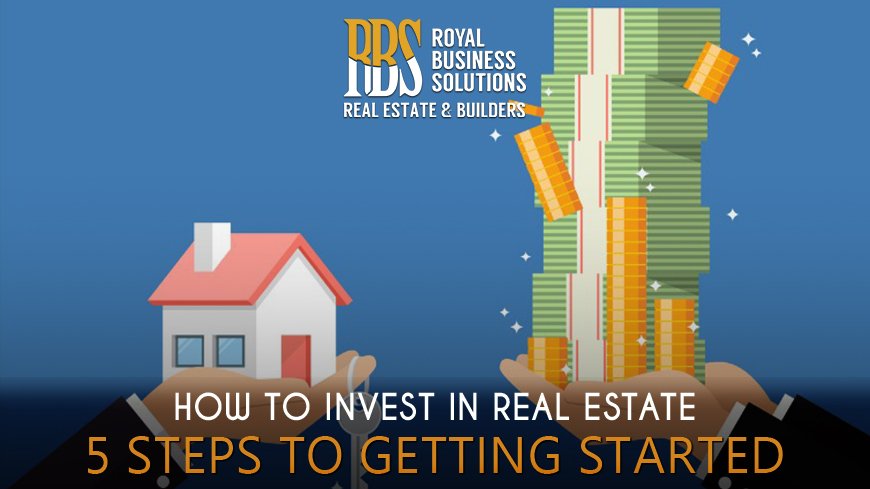- November 1, 2023
- Posted by: Muhammad Afzaal
- Category: Blogs

Introduction
Investing in real estate can be a lucrative venture, providing both financial security and the potential for long-term growth. Whether you’re looking to diversify your investment portfolio or build wealth for the future, real estate can be a great option. But where do you begin? To invest in real estate, start by conducting thorough market research to identify potential opportunities.
Next, secure financing and assess your budget. Consider rental properties for long-term income or fix-and-flip for short-term gains. Finally, seek professional advice, diversify your portfolio, and be prepared for ongoing property management and maintenance.
In this blog, we’ll outline five simple steps to help you get started on your real estate investment journey.
Five Ways to Begin Your First Investment
Starting your first real estate investment doesn’t always mean buying rental properties and being a landlord. There are other ways for beginners to invest, even with smaller amounts of money. So, if you’re thinking about to invest real estate, here are some ways to think about it.
1. Real Estate Investment Trusts (REITs)
For individuals who desire to own a rental property but don’t want the hassle of managing it, Real Estate Investment Trusts (REITs) are an excellent choice. These companies operate across different real estate sectors, owning, financing, and overseeing real estate on behalf of others. It’s a convenient option for those who wish to avoid the responsibilities of property management.
These companies allow investors to put their money into real estate without needing to purchase a property themselves. The companies handle all the work, and investors only need to purchase shares in the bigger company. This means investors can make money without having to deal with anything themselves, as these REITs or corporations handle everything on their behalf.
Real Estate Investment Trusts (REITs) offer:
- Diversification
- Regular Income
- Tax Advantages
- Passive Investment
- Potential for Growth
Read: REITs Vs Real Estate: Which Is The Better Investment?
2. Real Estate Crowdfunding
Real Estate Crowdfunding is an online approach where several investors come together to collectively invest in real estate projects. Instead of directly purchasing properties, these investors pool their money to acquire a property with the goal of making a profit. Typically, these investments are held for a set period, with a predetermined profit-sharing arrangement.
In real estate crowdfunding, all activities are conducted through online platforms, with investors seeking monthly or quarterly profits. Additionally, investors typically commit to real estate projects for longer durations than usual.
Here are the advantages of investing in real estate crowdfunding:
- Invest in Real estate crowdfunding provides transparency throughout the entire process.
- These platforms often yield higher returns on investment compared to traditional methods.
- Experienced professionals on real estate crowdfunding platforms assist investors in project management.
3. Invest in Rental Properties
This is a highly impactful method for entering the real estate industry, offering a means of generating passive income and ensuring financial stability for many individuals. Rental properties involve either purchasing a property for tenant leasing or already owning a property with the intention of renting it out. It’s a straightforward option if you’re capable of managing tenants and property maintenance.
Rental properties offer a significant opportunity for buy-and-hold investors to create a sustainable long-term income stream. Some individuals possess a wide range of skills and can manage the property themselves, while others find it necessary to hire someone for property management duties. This management person oversees all maintenance tasks for the property.
Here are the benefits of acquiring or owning a rental property in the real estate industry:
- Potential for capital appreciation
- Growth in property value
- Consistent passive income flow
- Control over rent rates and tenant selection
- Tax advantages, including deductions for property taxes and more
4. Fix-and-Flip Properties
Another significant approach to invest in the real estate industry is through the practice of buying and renovating properties for resale, known as ‘fix and flip.’ This strategy is best suited for individuals with experience and in-depth knowledge of the real estate field, particularly when it comes to identifying valuable properties.
The fix and flip method entails purchasing a property at a lower value, making substantial investments in its renovation and enhancement, and subsequently selling it after conducting thorough research. It’s crucial to note that not every property is suitable for the fix-and-flip approach, and having a good understanding of property values is essential for success in this venture.
When it comes to house flipping or fixing and flipping properties, there are two methods:
Method 1: Renovate & Sell
This involves buying and renovating a property that you expect will increase in value in the near future.
Method 2: Hold & Sell
In this approach, you buy a property that is on the rise in the market, hold it for a few months, and then sell it at the peak time to make a profit.
5. Vacation Rentals
Vacation rentals, often referred to as holiday homes or Airbnb-style accommodations, are a popular alternative to traditional hotels when traveling. These are fully furnished properties, such as apartments, houses, or even unique accommodations like treehouses or houseboats, that travelers can rent for short-term stays. To invest in real estate, vacation rentals can play a vital role.
Vacation rentals offer more space, privacy, and often a homely atmosphere, making them ideal for families and groups. Also, they have gained significant popularity with the rise of online platforms that connect property owners with travelers seeking unique and personalized lodging options for their vacations
Vacation Rental Factors:
- Size and Amenities
- Review and Ratings
- Booking Policies
- Local Regulations
- Guest Limits
Also Read: Writing Creative Real Estate Listing Descriptions: 5 Pro Tips
Conclusion
In conclusion, to invest in real estate can be a lucrative and rewarding endeavor, but it requires careful planning, research, and a long-term perspective. Whether you choose to invest in residential properties, commercial real estate, or real estate investment trusts (REITs), the key is to understand the local market, conduct thorough due diligence, and diversify your portfolio. Real estate can provide a steady income stream and the potential for property appreciation, but it also comes with risks and requires active management.
Furthermore, success in real estate investing often hinges on your ability to adapt to market conditions, stay informed, and make informed decisions. With the right approach, real estate can be a valuable addition to your investment portfolio.
For a secure real estate investment check out Capital Smart City.
